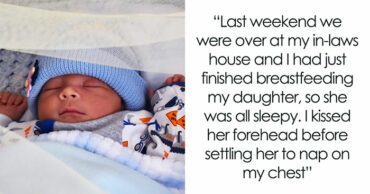Whitney Goodman, an author and a licensed marriage and family therapist from Florida, has over 550,000 followers on Instagram alone.
She regularly creates content about relationships, and her recent videos on making children choose sides in a ‘bad marriage’ and treating them like adults have gone particularly viral.
In them, Goodman explains why she thinks that one of the worst things a parent can do is fight with their partner in front of their kids.
This is Whitney Goodman, a mother, licensed psychotherapist in Florida, and the author of Toxic Positivity

Image credits: sitwithwhit
Recently, she made a video about kids who grow up with “teams” in their families
“Okay, so this video is for anyone that grew up in a home where your parents would fight a lot and their marriage was really bad. Tell me if this happened to you. If you grew up in this kind of a house, you may have noticed that your family would split off into, like, different alliances or teams to try to manage the marital discord. So because the marriage wasn’t a good, safe foundation for the family, everybody else had to kind of go and form these new teams.”

Image credits: Wavebreakmedia (not the actual photo)
According to Goodman, they are forced to choose sides
“So maybe you and your dad teamed up and you would talk bad about your mom, like mom is crazy and we need to, like, fight against her. And maybe your other sibling was teamed up with your mom and would start acting like her and maybe started to behave in similar ways and everybody was trying to find stability, but also out to get one another at the same time.”

Image credits: whitneygoodmanlmft
And are robbed of growing up in a stable environment
“You’re all looking for safety and trying to find it in different ways, and you’ll never be able to achieve the same type of stability you would’ve felt if your parents had like that concrete, stable relationship.”
Broadcaster, lifestyle blogger, and parenting expert who runs the website Honest Mum, Vicki Broadbent thinks that modern families really need togetherness.
“It’s vital that families stick together where possible (obviously, if members are toxic and separation/ estrangement is necessary then, of course, that’s best) but on the whole, relationships require compromise, respect, and a level of tolerance,” the author of Mumboss: The Honest Mum’s Guide to Surviving and Thriving at Work and at Home told Bored Panda. “It’s easy to quickly walk away but retaining a close family unit helps with raising children. It takes a village, as the well-known African proverb goes.”
When disputes do arise, Broadbent said it’s ideal to calmly talk through events, with an impartial mediator present (someone who can remain objective) so you can work through issues.
“Learning to respond rather than react means taking a deep breath before potentially arguing. If you’ve tried to resolve issues to no avail and really given things a go, then consider it might be healthier for all to keep your distance. We don’t choose our family after all,” she explained. “Try to be objective when issues arise, take time away from heated moments, sleep on arguments so you can return more calmly at a later date when resolution is easier than when you’re feeling more emotional and upset.”
Goodman said that as hard as parenting can be, moms and dads shouldn’t get a free pass

Image credits: whitneygoodmanlmft
And that it’s actually the children who deserve more empathy
“I get so many comments from people when I talk about adult kids and their parents saying, you know, parents are people too and we need to have empathy for parents. And I’m a parent, I get that. I think parenting is one of the hardest things that you will ever do. But actually, what I find is that people have no empathy for kids.”

Image credits: whitneygoodmanlmft
Even when they grow into adults
“People expect kids to act like adults. And then in my experience, when they become adults, parents look back at their experiences as if they were adults, moving through all those life stages the entire time. And the focus is really put back on the parent. ‘You don’t know how hard it was for me. You’ll figure it out when you become a parent. I didn’t have money, I didn’t have resources.'”

Image credits: Wavebreakmedia (not the actual photo)
“And all these things can be 100% true and real, but we have to be able to hold empathy on both sides of that coin, right? And when we’re having these conversations, this will always be true. The child was a child who was helpless, defenseless, and unable to care for themselves physically and emotionally. The adult had power and had options, and when we keep that in mind, it makes the conversation a little bit more fair.”
The therapist received comments from people who disagree with her

Image credits: whitneygoodmanlmft
“I wanna reply to this comment, not because I wanna reply to this person specifically, but because they’re bringing up something that I hear a lot and I think it’s important for us to talk about.”

It’s a complicated dynamic
“They’re saying that once a child grows up and becomes an adult, their relationship with their parents and their trauma from their childhood is their business and their thing to heal, and that the parent is not responsible anymore for healing that. And I wanna consider and reconsider why we think about child and parent relationships in this way because it’s really the only relationship that we think of in this way. There’s no other relationship that I can think of where someone would be abused, hurt, ridiculed, denied needs or rights, and we would say, ‘You know what, that’s your problem now. You need to figure that out.’ But we tend to do that with adults and their parents.
And it’s always under the guise of like, well, they did the best they could. And now if you got hurt by that, that’s your problem. And I think there’s a lot of empowerment in telling adults that your childhood is not going to dictate your life. It’s over now and you can work on it. But we also need to work on the dynamic and the healing that happens when parents are able to say, ‘You know what, maybe I tried my best and it wasn’t good enough. Maybe I did hurt you. Maybe there is something that I can apologize for and I can take ownership of to allow us to have a good relationship moving forward.'”
The relationship between parents and adult children suffers when it fails to evolve. According to another marriage and family therapist who explores this topic, Sarah Epstein, people can help it grow by asking themselves questions like:
The answers to these questions can illuminate the best and most challenging parts of the parent-child dynamic. Once each person has noticed what’s working and what’s not, families can openly and honestly communicate their needs to one another and negotiate new terms for the relationship. These requests can be crafted like this:
These conversations may be uncomfortable, but they can be very effective.
The good thing is that moms and dads are aware that they need to set up their children for success. Four in ten U.S. parents with children younger than 18 say they are extremely or very worried that their children might struggle with anxiety or depression at some point. In fact, mental health concerns top the list of parental worries, followed by 35% who are similarly concerned about their children being bullied.
But at least we’re talking about it





















 Follow Us
Follow Us





